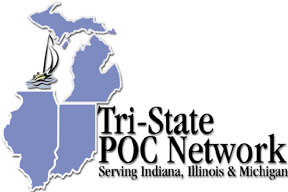|
Sponsors: Biosite, Ryan Diagnostics, Spectral Diagnostics, Instrumentation Labs and Medical Automation Systems |
|
|
|
|
|
August 6, 2003 Meeting Minutes |
|
|
Serving Illinois, Indiana and Michigan,
our groups April meeting will
provide an excellent educational opportunity for all who
attend.
So make plans to attend today! CORE MEMBERS • Wendy Denk MT (ASCP), Ingalls Memorial Hospital • Gil Salas MT (ASCP) • Darlene Sobucki RN, CLS (NCA) |
The
second meeting in 2003 of the Tri-State POC Network serving
Illinois, Indiana and Michigan took place at the Radisson
Hotel in Merrillville, Indiana on Wednesday,
August 6, 2003 from 8:00 AM to 3:00 PM.
The meeting was attended by 40 registered healthcare
professionals as well as representatives from the program
sponsors and vendors: Biosite, Instrument Laboratories, RDI
(Ryan Diagnostics), and Spectral. The
meeting commenced with the introduction of the core group
and opening remarks by Darlene Sobucki, founder of the
Tri-State POC Network.
Members of the core group include: Wendy Denk,
Ingalls Hospital, Harvey, IL; Gil Salas, Univ of Illinois
– Chicago, Chicago, IL; Darlene Sobucki, Advocate Trinity
– Chicago and Advocate South Suburban, Hazel Crest, IL. The first presenter for the day was J.H. Keffer, MD, and was sponsored by Spectral. His topic, “Update on Cardiac Markers: the Key to MI Outcomes”, focused on the comparison of the guidelines between Europe and the USA for the utilization of Troponin I or T as the preferred marker for cardiac testing. In fact, the Troponin markers are the new gold standard for both Europe and the USA. He stated that two negative troponins are necessary to rule out an infarct and if the main lab cannot consistently provide results within 30 minutes (USA) or 60 minutes (Europe), then POC testing should be encouraged. He feels that POC testing can reduce TAT by at least 5-10 miutes and in the case of an infarct, every minute counts. And as is the case for any testing, there is a need to have a Quality Program and recommends reviewing the ACC/AHA (USA) Guidelines to establish such a program. Fritz Krebs and Kevin Fallon, PhD presented “An Introduction to the GEM PREMIER 3000”. IL (Instrument Laboratories) has over 30 years Blood Gas experience and released the GEM PREMIER 3000 this past February. It utilizes a self-contained PAK which includes all analytical components, requires no maintenance and the used materials don’t require special handling other than disposal in red biohazard bags. There are different size test cartridges (75, 150, 300, 4540 or 600 tests) and on board stability is 2 weeks to 4 weeks, depending on the number of test cartridge used. The GEM PREMIER utilizes a new approach to quality management called iQM, intelligent quality management, which is an active quality process to provide continuous monitoring of the analytic process. This approach replaces the traditional external quality control process whereby a commercial sample is analyzed every so many hours for “correctness” but which can’t identify when a problem may have developed between control runs. The iQM will automatically perform corrective action without operator intervention and will automatically document the action. It monitors System checks, cartridge fluid checks, cartridge mechanical checks, instrument heater block checks and instrument electronic checks and all samples are monitored with a system check. There is an auto-shut off if the system checks fails and will remain off until the analyzer solves the problem. Traditional QC programs can take well over 8 hours to determine there is a problem and how to solve the problem whereby the iQM system determines the problem before it can be determined by an external QC material. Following
lunch, we listened to Kevin Fallon’s presentation “The
In’s and Out’s and Still Meeting Regulations”.
Dr. Fallon, PhD, stated that lab managers confuse
regulations with quality management and that labs need a
goal for a comprehensive quality management program.
One of the most important part of a quality program
is documented training for all people involved in
performing procedures.
He also stressed that the Standard Deviation is the
thumbprint of the instrument, it doesn’t matter what the
value is that is set by CLIA, CAP, JCAHO, etc, if the
instrument isn’t performing correctly.
It is important, however, to detect immediate errors
and correct those errors and don’t forget to define
immediate (don’t ask me how).
He also strongly suggested everyone to visit www.Westgaard.com
. Our
final speaker (sponsored by Biosite), Holly Kunz, RN,
provided us with an insight on “POC from a Nursing
Perspective – Communication and Compliance with the
Nursing Staff”. Holly
related how she became involved in POC testing and how she
got “buy in” from the ED staff at her hospital in
Nashville, TN. The
best way for POC testing to be approached to the nursing
staff is to always bring the basics down to the patient
level. Once a
nurse is shown the benefits of POCT to the patient, they
will be much more receptive to the added work, so find a
couple of receptive nurses to become Super Users.
And don’t rush the nurses, remember that they like
to take care of the patients, not machines! And one more
thing, feedback is required so let them know the good and
bad and listen to their concerns and be willing to make
changes accordingly. And a reminder: Due to the rise in costs, the Tri-State POC Network will be imposing a $15 registration fee, payable in cash at the door. Thanks to all who attended this first meeting that required a payment, it was nice to know that our meetings continue to provide an outlet for a network for POCT professionals as well as provide educational opportunities. Your input is valued, please let any member of the Core Group know of topics that interest you. The
next meeting will be December 3, 2003 at the Radisson Hotel,
Merrillville, IN. Respectfully
Submitted, Wendy Denk, MT (ASCP) |
Return to PointofCare.net Home Page
Questions or corrections: Webmaster
